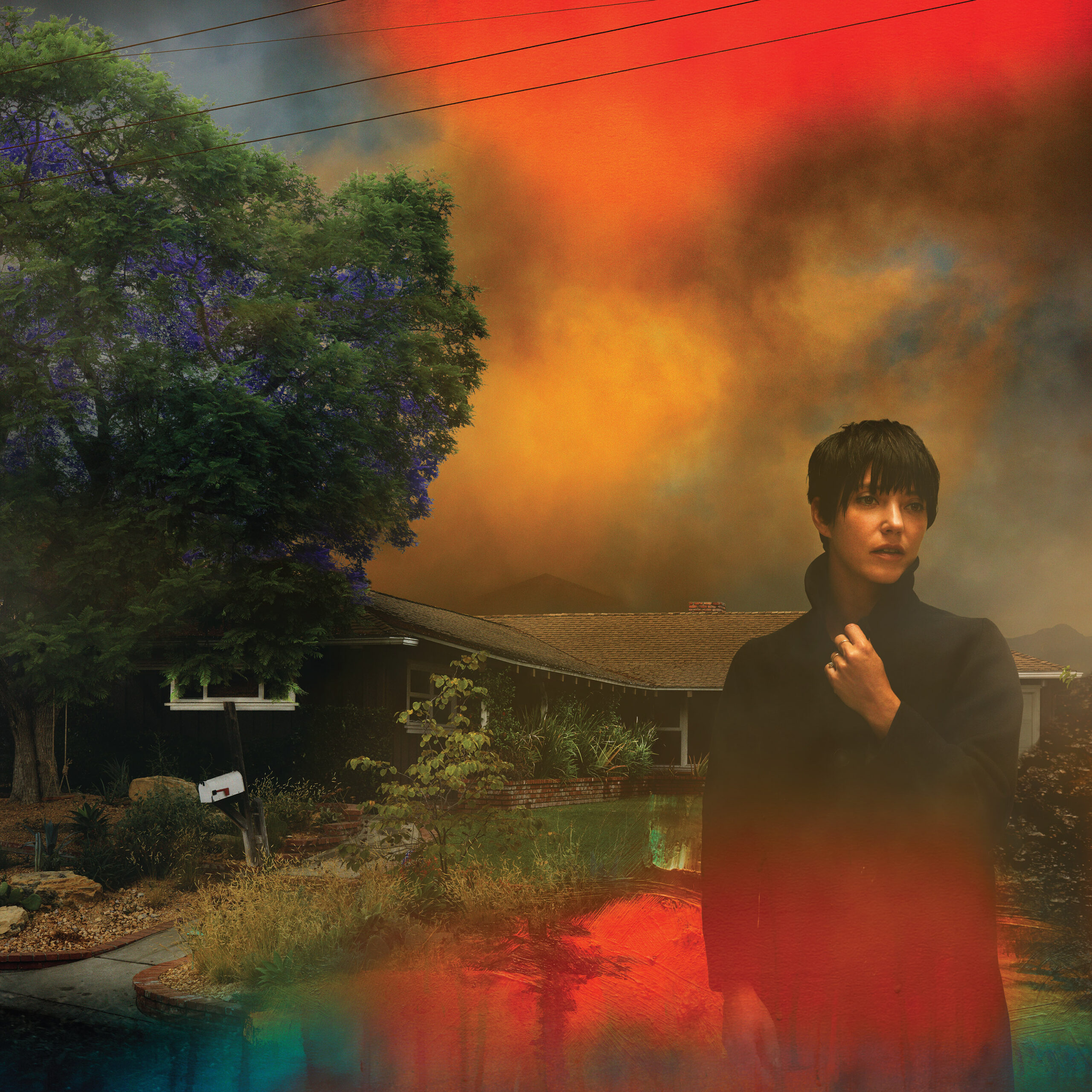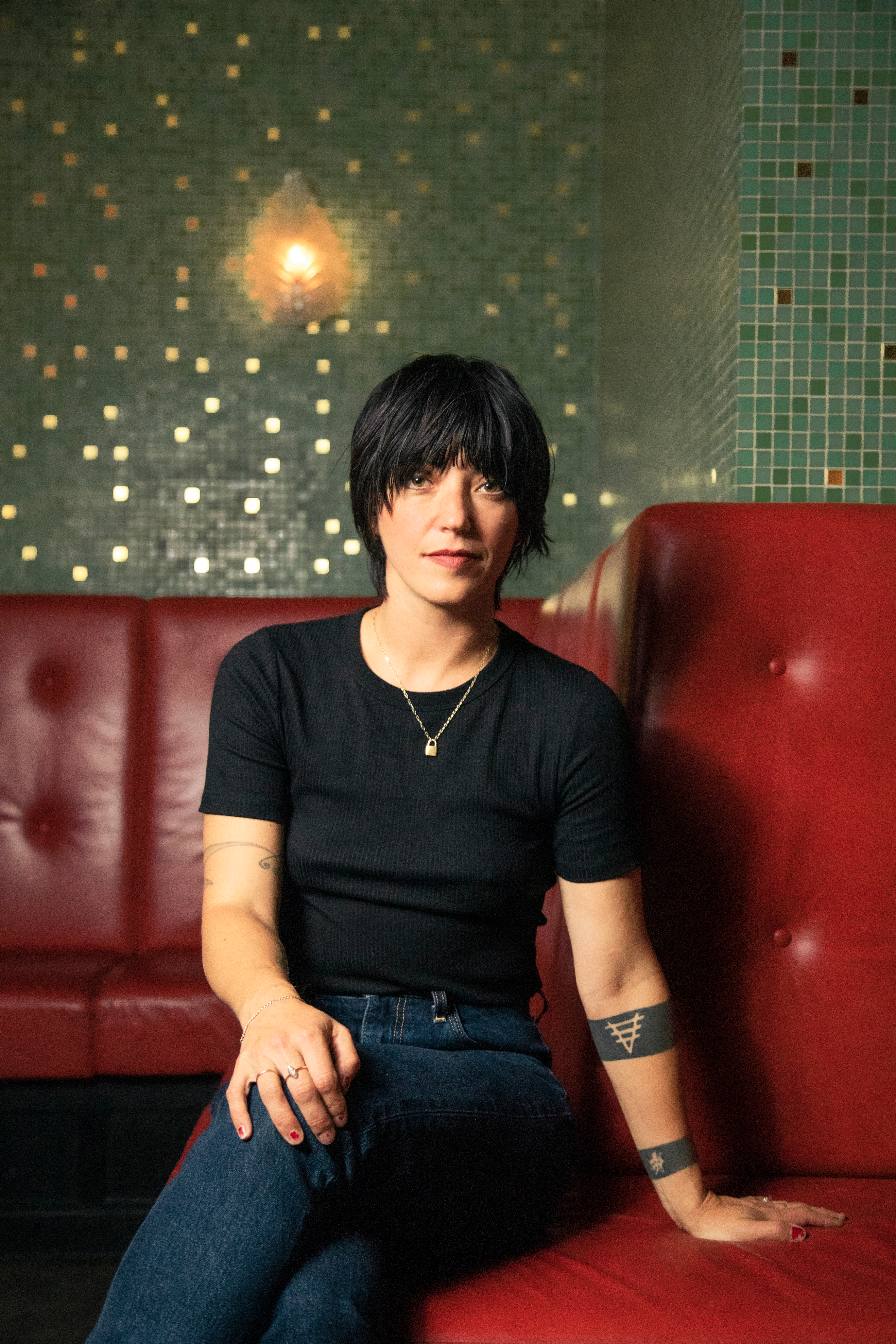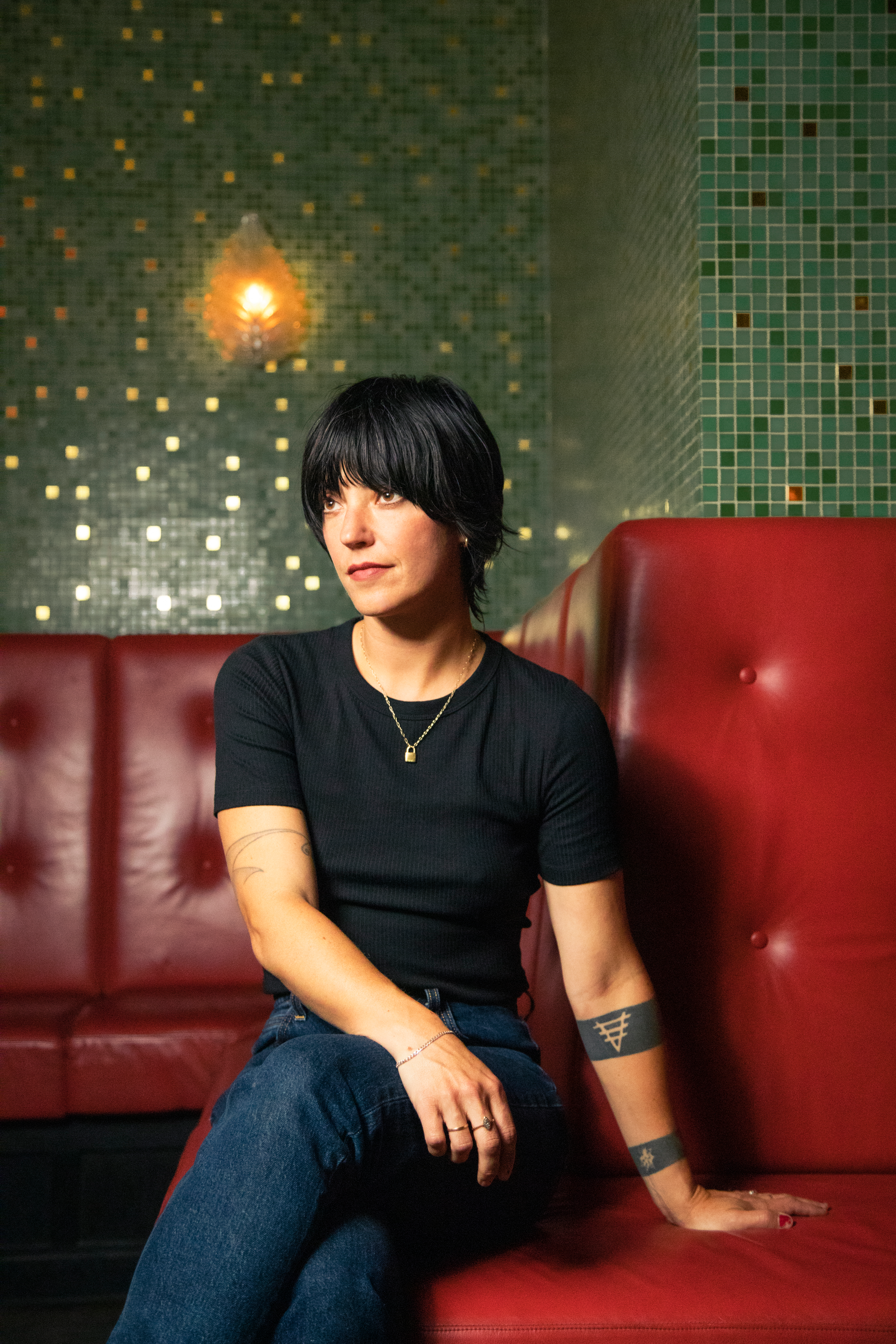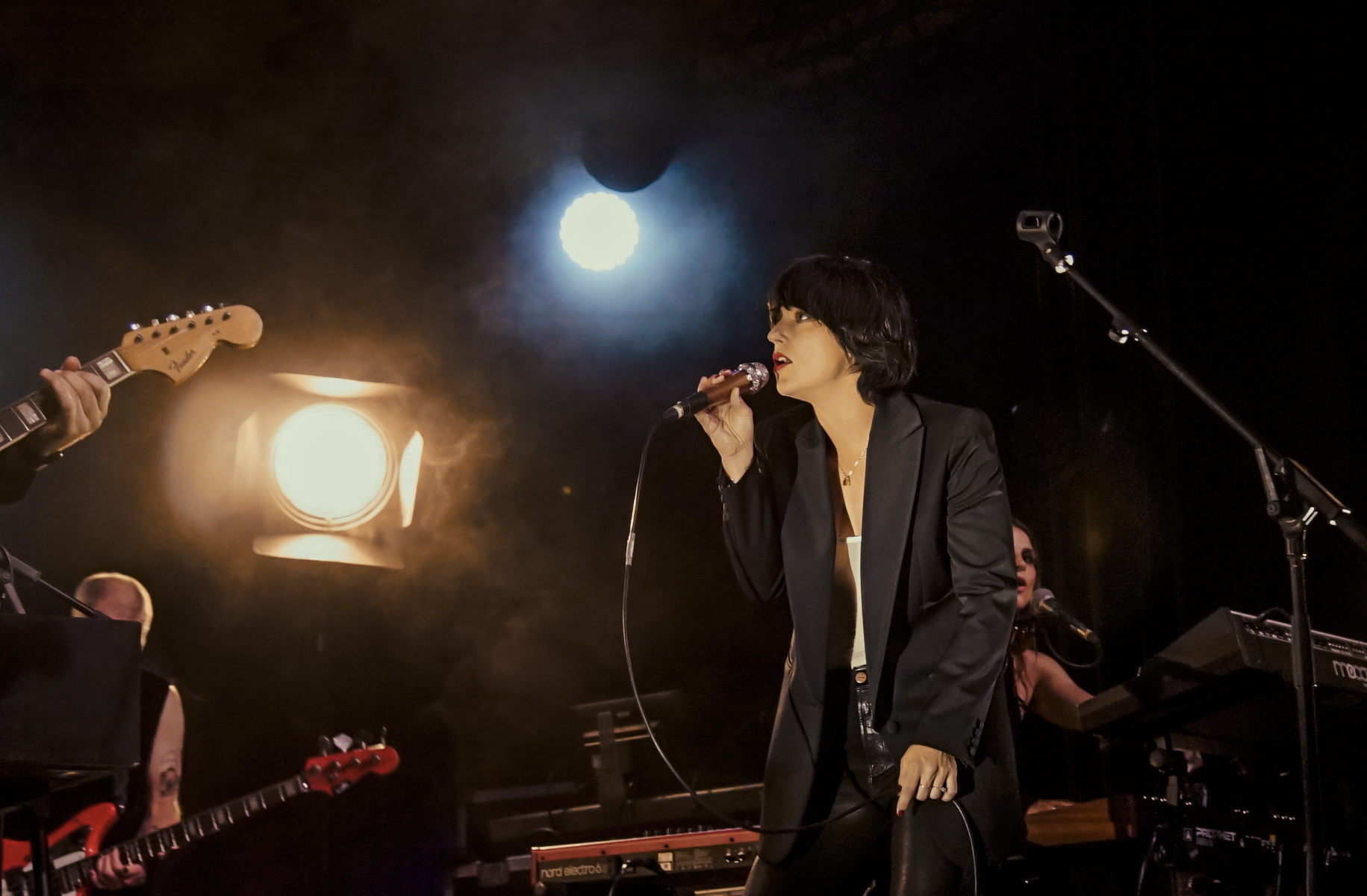Foto-© Geraldine Hutt
Im Mai erschien mit We’ve Been Going About This All Wrong das sechste Album von Sharon Van Etten. Aufgenommen in ihrem Heimstudio in Los Angeles erzählt es von Komplikationen, verzweifelten aber auch hoffnungsvollen Momenten der letzten zwei Jahre. Es ist ihre epischste, aber auch dunkelste Platte. We’ve Been Going About This All Wrong beschäftigt sich damit, wie wir fühlen, trauern und unsere Handlungsfähigkeit zurückgewinnen, wenn wir glauben, dass die Welt – oder zumindest unsere Welt – auseinanderfällt.
Wir haben Sharon Van Etten auf ihrer Darkness Fades Tour im Juni in Berlin getroffen. Im Interview sprechen wir über die Arbeit an ihrem aktuellen Album und warum Toningenieur Daniel Knowles ein wichtiger Partner bei der Herausbildung ihres neuen Sounds war. Außerdem erfahren wir, wie die Möglichkeiten in ihrem Heimstudio dazu geführt haben, dass ihr sechstes Album eine Zusammenführung früherer kreativer Stränge ist. Van Etten spricht über veränderte Verantwortlichkeiten als Mutter, aber auch als Künstlerin ihrer Tourfamilie gegenüber und warum sie sich dazu entschlossen hat, vor dem Release keine Singles aus dem Album zu veröffentlichen. Wir erfahren, dass sie sich fragt, wie sich ihr Sohn an diese besondere Zeit erinnern wird, warum sie geheime Botschaften an ihn in ihren Songs untergebracht hat und dass sie Abstand zu ihren Liedern braucht, um deren wahre Bedeutung erkennen zu können.
 It is exciting to meet you on tour, thank you for taking the time. You have worked on your new album We’ve Been Going About This All Wrong with a member of your tour-family. Daniel Knowles, who is your front-of-house engineer, has engineered most of the record. How did it come to that?
It is exciting to meet you on tour, thank you for taking the time. You have worked on your new album We’ve Been Going About This All Wrong with a member of your tour-family. Daniel Knowles, who is your front-of-house engineer, has engineered most of the record. How did it come to that?
Daniel Knowles is amazing. I met him before he did our front-of-house. He was helping me to make sense of the demos for my previous record Remind Me Tomorrow. Before I went into the studio and before I knew I wanted to work with John Cogleton he met me at a practice space. He helped me mix my instruments to prepare for a solo show as I experimented with new songs live. How he mixed that set-up, it gave me more conviction on what I wanted on the record. Because I had such a great experience working with him on the demos, I asked him to mix Remind Me Tomorrow live. He elevated my songs to this other place. He really got my references to PJ Harvey and Nick Cave. I felt like he leaned into the edginess and the darkness more than I had had before. Although, I loved everyone I worked with, other people appreciated how my songs were innocent and sweet. As my songs got dirtier over the years, I finally found someone to see that through. When COVID hit, I relied on my band a lot to help me feel motivated. They would write to me and ask me what I was working on. They encouraged me to send them demos early on and Dan helped me to get my studio together to track my demos. As I realized what I wanted the record to be, I told my close band. I wanted to bring them in closer and show them that I appreciated everything they had done before COVID and all the support that I got during. I wanted to give back. Dan heard a lot of my demos before and after. He seemed to be so much part of my process that I do not know how I could have done this with anyone else.
You said that you always take something from the previous record and apply it to the next one. Was it that darker mood for We’ve Been Going About This All Wrong?
I feel like it was the first time after all these years and accumulating different instruments, I was able to unpack them all. They are all in my space, they are all in my studio. I integrate them into my writing and not just in the recording process in a way I had not had before. So, in a way, this record is a combination of all those records: trying to bring in the acoustic as well as the electric, trying to bring in the piano as much as the synth, marrying the real instruments with the synthetic instruments. That is interesting to me. I would not have had the drive to that if it would not have been for Remind Me Tomorrow.
Does being on tour with the new album change your relationship to the songs?
I am still figuring that out – for this record anyways. Whenever I look back on a song or an album, it usually takes me some time and distance to look at them in a different way. I still feel very much in these songs. They represent the last couple of years: us in quarantine, us working from home, us figuring out our new dynamics and relational stuff. This is still happening. It is not something that is over and I can reflect on yet. Right now, I feel like I am giving everyone the news [laughs].

A remarkable thing about the record is the message that it is okay not to know or to make mistakes or to fail – to live with uncertainty. It is not a catharsis-tale of going through something and feeling so much stronger after. Is that something you had in mind writing it?
I did not know what I had in mind while I was writing it. Whenever I do sit down and write, it is because I am having a hard time articulating my feelings. Obviously, looking back and deciding which songs I wanted to share, I wanted it to feel relatable. A lot of what I wrote about was the unknown and also the frustration. But with all those dark periods, there is that feeling that it is going to pass. Everything passes, feelings pass, relations change. You have to hang in there and take it day by day, even though every day is not perfect. There are these moments, that are hopeful and that we have to hold on to. But I know it is not perfect yet. It was me talking to myself a lot. I have friends who experienced similar emotions, even though we had different situations. That was the message I really wanted to share.
 You said that you also tried to pepper in secret messages to your child for when he is old enough to listen to it.
You said that you also tried to pepper in secret messages to your child for when he is old enough to listen to it.
I am curious right now what he is going to remember about COVID, about us moving around a lot, about me being on tour again. Will he remember me being gone a lot; will he remember visiting me? Will he look back on it as being a difficult time or will it be just a memory with no negativity attached to it? But either way, I wanted to put these secret messages in it so that one day, when he listens back to the songs, he knows that I knew it was hard. He may not even think so. But I want him to know that I was thinking about him.
You have decided to not publish B-sides but not any songs from the album before it came out. People had to listen to it as a whole and not bit by bit. Especially with music streaming and the high demand of new material that seems quite rebellious. What were your reasons to do it that way?
There were a lot of reasons. I have worked on different sides of the industry. I know what works and I get it: six months lead time, cherry pick your favorite periodicals, pick the songs that are going to be the most immediate for the listener. In hindsight, Mistakes would have been the single for the record, but I love every song. They are all my children. I do not think Mistakes sums up the record. You could pick a few songs from it, and I do not think, they would sum it up. I felt like I would be doing a disservice to the songs, to my band and to the last two years to not represent the album and to send my message. I wanted it for fans who missed my music and who missed this experience to actually feel special. This felt like a gift to give people. There are people trying to do the single driven thing and gain a lot of fans by landing a random hit. It is not that I am better than that, I am just not that kind of an artist. My songs are too long, a lot of them are mid-tempo, they are super dark. I also want to put a message out. I am trying to connect to the true fans that want to understand what it is I am saying. The order of the songs is very important and the sequence and the roller-coaster of emotions that we all felt. I picked those songs on purpose and the transitions between key changes, tempo, and instrumentation. There is a push and pull in there that a lot of us felt in different ways that I was trying to carry across to the listener.

Another big change in making this record was that you recorded it in your new home studio. How did that affect your working process?
During the height of the pandemic, my partner and I were learning how to give each other time and space. His work demands him to work normal hours, my work is a bit more flexible. But when I feel inspired, I could just walk through my backyard and go into the garage and get it down. When my kid goes to sleep, I could work a couple of more hours on something. I had instruments lying around, I did not have room for before. If I got a last-minute project like, “I need a vocal tomorrow, can you do it?”, I could actually say yes. It has been nice to record quality tracks that can be used, and I do not have to go to a pro studio and re-do them most of the time.
Do you need more discipline to start or to stop? The process seems more fragmented.
It is hard. A big part for me was switching from domestic mode. I learned that we needed help. When my son was not at school and we did not have a sitter that was really hard. Admitting that we needed help and figuring out how to do that in a safe way all of a sudden I felt a load off. My partner felt bad because he knew that a lot fell on me. It is not like he does not do these things, but he can turn it off very easily. I cannot get anything done if the house is a wreck. I cannot work in chaos; my brain is chaos. The structure of a family helps me because I want to be present.
 On We’ve Been Going About This All Wrong you are talking about the challenges of combining different roles in your life. Is that something you are facing more getting older or has that always been there for you?
On We’ve Been Going About This All Wrong you are talking about the challenges of combining different roles in your life. Is that something you are facing more getting older or has that always been there for you?
When I was a solo artist with no boyfriend and no home it was music night and day, hanging out late and feeling like I was immortal. Now that I am older, I am in a healthy relationship and I have a child, I feel much more of my mortality than I ever have before. I feel more responsibility to keep it together for them and wanting to sustain my career. If I kept living like I was living then, I would not be able to make it. Not that I was a train wreck but touring in your 20s is much different from touring in your 40s. I feel these songs more than ever in my throat. I used to smoke so much, I used to drink so much whisky. I also have a road family. I am taking care of them as well. I always want to be a mama and make sure that everyone feels taken care of. There is a part of me that cannot wait to phase out touring, because it is so hard. But at the same time, I feel responsible to support the people that have been amazing. They are my best friends. I feel responsible for a lot of people in a way that I never have before.
You are collaborating a lot, you have written for television, you made film music. How do you decide, which idea is for what?
If you looked at my house, you would see that I am a pile person. I am the same with the organization of my music. I can write a song and know that it is definitely a SVE-song. Or I write a song and I do not know what is yet. I have a folder of “it is a good song, but it is not quite there, or it does not fit of what I think I am doing right now”. I separate things. I have a folder that is just full of piano ballads. I have another one that is just so dark that it feels more experimental. When you start looking at things, it does not always need to be for you. When something comes up or someone needs a song or if you are trying to write and song with someone and it is not happening, you can pull out an unfinished one. It is helpful to have those things. I write and write and write and most of it, I do not use. It is still sharpening the tool.
It sounds like you are a curator of your own ideas. How do you know which ones to take further?
It is not instant. Usually, it is a folder that starts with 30 songs. As I am testing them out with the band, talking them through with my circle, I feel like I am learning what the palette it. Once I know the skeleton of the palette, songs will naturally fall. It is tricky and it takes a while for me to know. I write a bunch and then I figure out what I am saying. I write stream of consciously. I listen back to them even if the lyrics are not quite done, the melody usually is. I listen to what I am saying, I listen to what I want the palette to be. For me, the melody has to be very strong and I have to feel something every time I sing it. Because I know I will have to sing it for a very long time.
Thank you for the interview!










